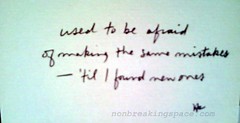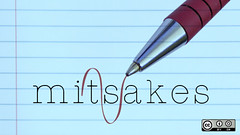When I first started blogging, back in the dusty days of 2006, I began with a Statement of Intent. At the time, it was designed to remind me of the reasons I started the blog in the first place as well as letting people know what they could expect from me and it.
Over the years my blogs have changed faces many times, but this new facelift is something more. The simplified design and stripped-down visuals serve to remind me of the meandering thoughts and intentions that I let take over here and to keep me sharply, intensely focussed on what this blog is becoming.
You’ll notice the old name, SmileThroughIt ((and I’ve moved all of the archives onto this single site, instead of stripped across two blogs)), is back because rack my brains as I may, I couldn’t think of a better way to sum up the purpose of this site or the ideas I live by.
What is SmileThroughIt? Put simply, it’s a philosophy of life that helped carry me through some of my toughest times. While waiting for my transplant, not knowing if it would come in time, I learned to focus on the good things in life. More than that, I learned that if I could find just one thing every day that made me smile, that day had been worth it.
This site is here to help me make the most of the second chance I’ve been given and if, through that, I can help, inspire or motivate other people, so much the better.
Before the lengthy break in updates, I’d started blogging to please others, to write what I thought people wanted, to ‘optimise’ my posts. But looking back over my archives, both on here and the original site’s archives, I saw that my best writing and the most effective posts came not from targeting an “audience”, but rather writing something for myself.
Although I hate to admit it, it’s not just my blog that has been through many twists and turns and a distinct loss of focus. Everything that’s happened in this blog has been mirrored in my day-to-day life and it bothers me that I feel like I’m letting this second chance slip past me without grasping every second.
This blog will reflect my change in mood, attitude and approach to my second chance at life and, hopefully, will help guide others through similar changes in their own life.
This story has no planned ending, no final goal, no means by which to measure its success or failure. This blog, like all of us, just is. And what it is comes from what’s inside and the people who read, contribute and support its aims, ideals and author (that’s me) along the steps of its journey.
Come along for the ride.







